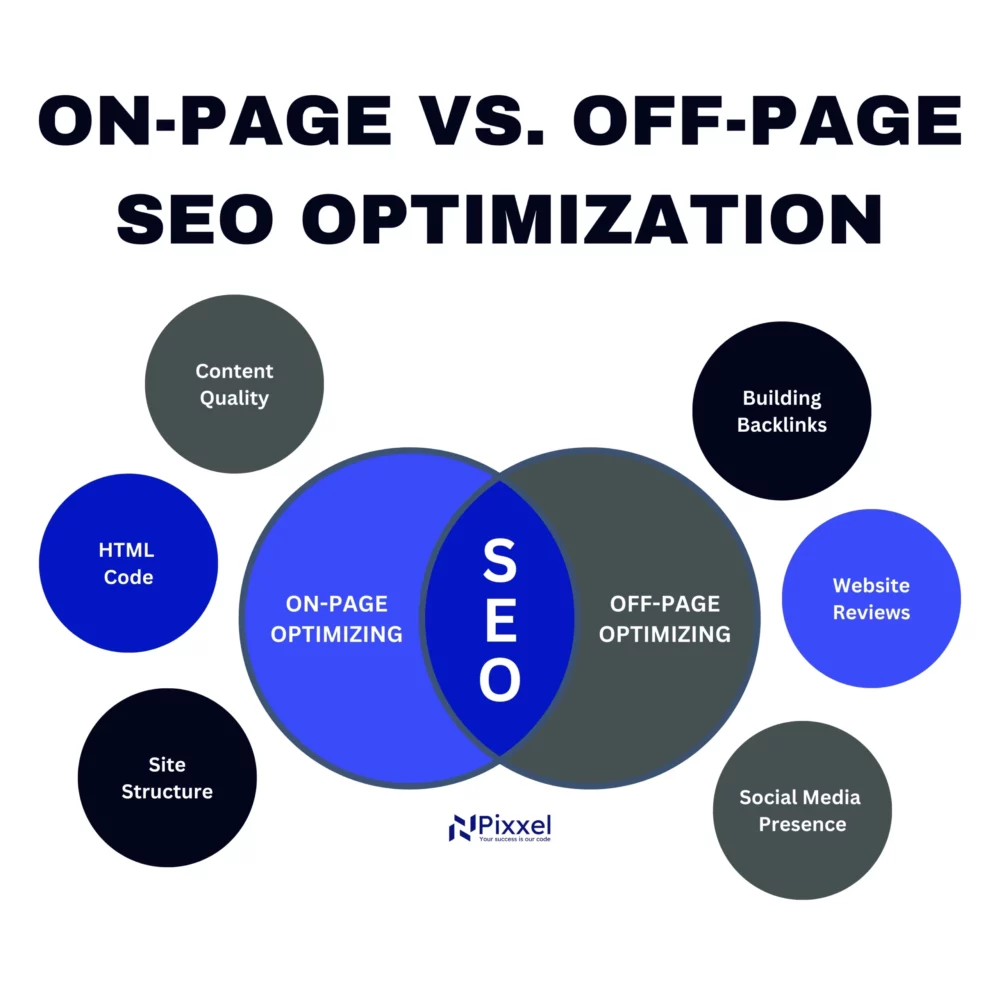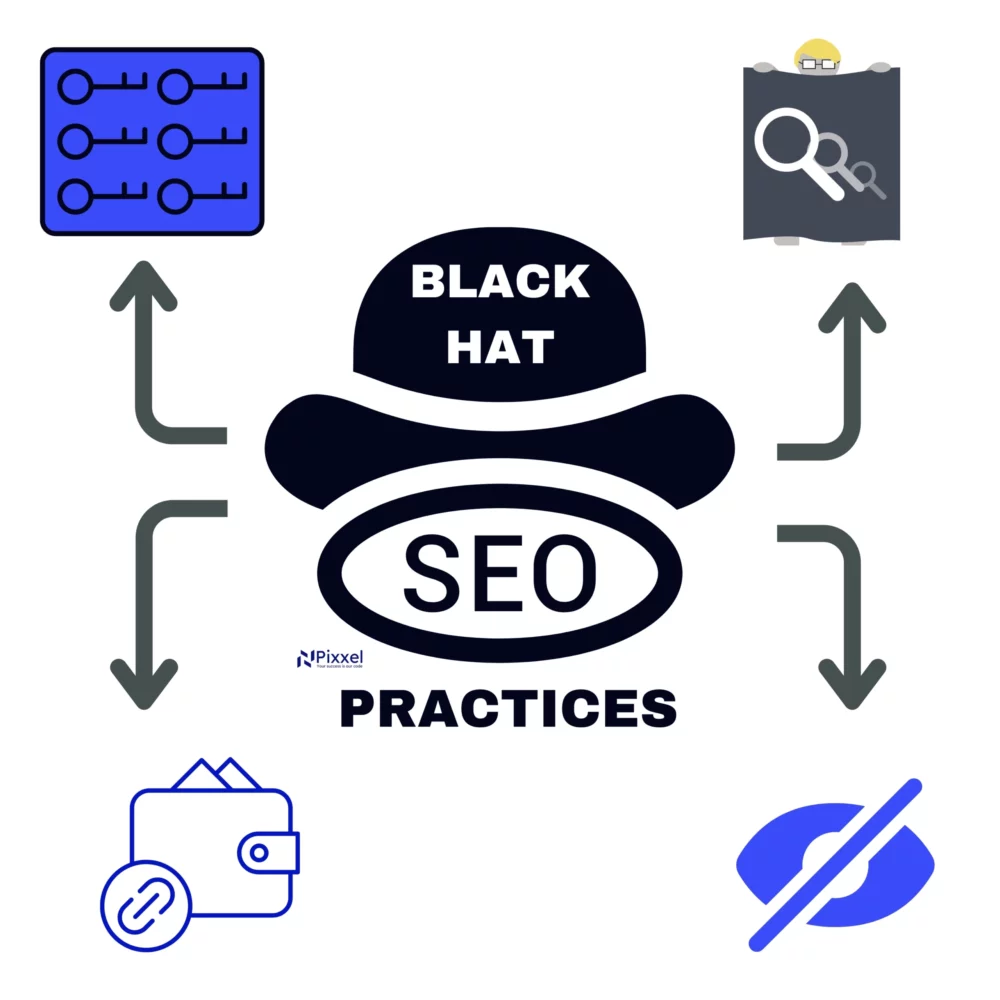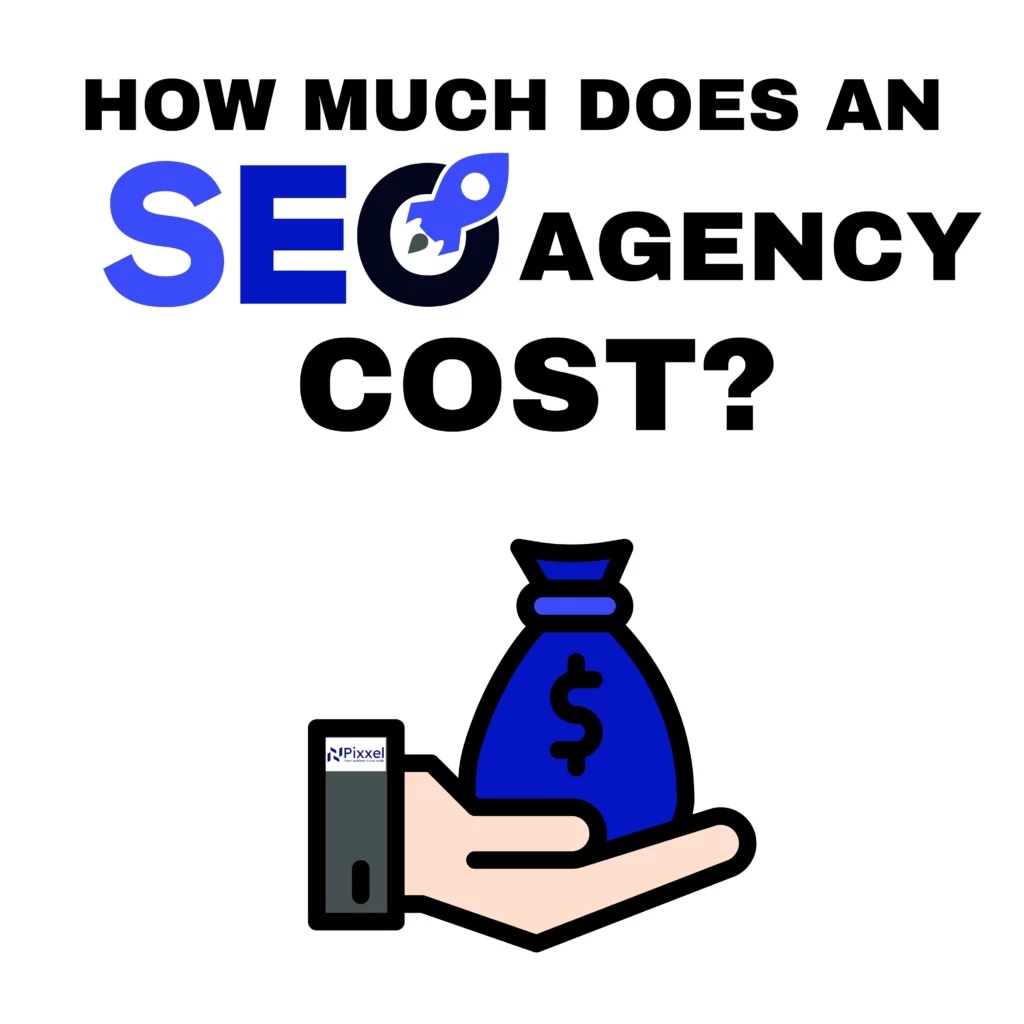In the realm of Search Engine Optimization (SEO), grasping the difference between on-page and off-page optimization is essential for crafting a well-rounded strategy. Both elements are pivotal for enhancing a website’s visibility and boosting its ranking in search engine results, yet they concentrate on distinct facets of the optimization journey. Let’s delve into what sets them apart and how each contributes to your site’s success.
What is the Difference between On-Page and Off-Page?
You can take different measures in On-page optimization to improve your website’s position in the search rankings. The content quality, site structure, HTML code, and user experience are all a part of it. Essentially, you are aiming to make your website as friendly as possible.
On the other hand, Off-page optimization involves activities outside the boundaries of the website. Building backlinks, improving social media presence, and increasing online mentions and reviews are all different aspects of it. Off-page SEO aims to enhance the site’s reputation and authority.
What Are Off-Page SEO Strategies?
Off-page SEO strategies are very important for building a website’s authority and trustworthiness. The site’s overall ranking and visibility are enhanced using these strategies.
How Can Social Media Signals Impact Off-Page SEO?
Off-page is significantly influenced by social media signals like shares, comments, likes, etc. Although search engines like Google do not consider ranking factors, social media can still generate more traffic, leading to more backlinks and improved engagement rates. If you want to promote your content, increase traffic on your website, and have high engagement with the audience, social media is perfect for you to boost your SEO strategy.
What is the Role of Online Reviews in Off-Page SEO?
Another critical component of off-page SEO is online reviews on platforms like Google My Business, Yelp, and industry-specific websites. Having positive reviews on such websites can enhance your website’s credibility and trustworthiness. Customers usually decide based on the reviews a website has, and having good reviews automatically leads to increased conversion rates. Ranking algorithms include quantity and quality of reviews of reviews, making them an essential factor in SEO.
How Do Brand Mentions Contribute to Off-Page SEO?
Brand mentions, even without direct links, are a significant contribution to off-page SEO because they enhance your online presence and authority. When a social media platform or website mentions your brand, search engines like Google can identify these mentions as a sign of your brand’s popularity and relevance. They also help build awareness about your brand and lead to increased search queries, indirectly boosting your SEO efforts.
What Are the Ethical Considerations in Off-Page SEO?
Maintaining a website’s integrity and avoiding penalties from search engines is crucial in off-page SEO. Ethical considerations include practices that avoid buying links, generating fake reviews, or participating in fake reviews that cause severe penalties and damage to a website’s reputation. It would be best if you built an ethical off-page SEO that involves earning backlinks through high-quality content, building genuine relationships, and encouraging real customer reviews. Sustainable SEO success demands maintained transparency and adherence to search engine guidelines.
What is On-Page Optimization?
On-page optimization involves developing individual web pages to earn more appropriate traffic and achieve a high rank in search engines. This process includes several key elements that work together to improve a site’s overall SEO performance.
What Are the Key Elements of On-Page Optimization?
On-page optimization involves several key elements that are crucial for your website’s success. Here’s a closer look:
- Content Quality: Crafting high-quality, relevant, and captivating content that is relevant to your target audience’s requirements.
- HTML Tags: Utilizing proper HTML tags, such as title tags, meta descriptions, and header tags, to help search engines grasp the content and structure of your page.
- URL Structure: Develop clean, descriptive, and keyword-rich URLs that are easily interpreted by both search engines and users.
- Internal Linking: Creating links to other pages within your website to enhance navigation and spread page authority effectively.
- Mobile Optimization: It would be best if your website is mobile-friendly, delivering an easy and comfortable user experience across all devices.
How Does Content Quality Affect On-Page Optimization?
On-page optimization heavily relies on high-quality content that provides value and relevance to the users. Users require relevant and relatable content, which automatically leads to improved website rankings. It would help if you used appropriate keywords naturally, well-structured and easy-to-read content, and provided comprehensive coverage of the topics to ensure that search engines also prioritize your website as informative, engaging, and relevant. High-quality content will attract more visitors, encourage longer visits, and promote more shares and backlinks.
What Role Do Meta Tags Play in On-Page Optimization?
Meta tags play an essential role in on-page optimization by providing search engines with crucial information about your page’s content. Here are some key Meta tags you should focus on.
- Title Tags: This is primarily the title of your web page that is displayed in search engine results. It’s important to include relevant keywords here to catch the eye of both users and search engines.
- Meta Descriptions: These are brief summaries of your page’s content that appear in search results. A well-crafted Meta description can significantly influence click-through rates.
- Header Tags (H1, H2, etc.): These tags help structure your content, highlighting important sections and establishing a clear content hierarchy. This benefits both users and search engines by making the content easier to understand and navigate.
How Does Website Architecture Influence On-Page SEO?
Website architecture refers to how a website’s pages are organized and structured. A well-planned site architecture makes it simpler for search engines to index and crawl your content efficiently. Here are some key aspects of effective website architecture.
- Clear Hierarchical Structure: Arranging content into logical categories and subcategories.
- Internal Linking: Building a network of internal links to direct users and search engines smoothly through your site.
- Breadcrumbs: Offering navigation aids that help users understand their current location within the site.
- Sitemaps: Using XML sitemaps to ensure search engines can find and index all the pages on your website.
Why is Mobile Optimization Critical for On-Page SEO?
A notable portion of web traffic comes from mobile devices, due to which mobile optimization is an essential factor for on-page SEO. Google uses mobile-first indexing, meaning it typically uses the mobile version of the content for indexing and ranking. You can improve your user experience and search engine rankings by ensuring a responsive design, user-friendly interface, and fast loading times.
How Can Internal Linking Improve On-Page SEO?
Internal linking, which involves creating links to other pages within your website, plays a vital role in boosting on-page SEO. Here’s how it helps.
- Enhancing Navigation: It makes it easier for users to discover related content and navigate your site smoothly.
- Distributing Page Authority: It helps pass authority from high-ranking pages to other pages, improving their visibility.
- Increasing Dwell Time: It encourages users to spend more time on your site by exploring additional content.
What is the Impact of User Experience (UX) on On-Page SEO?
User experience (UX) is an essential aspect of on-page SEO, as search engines favor websites that offer a positive experience to their visitors. Let’s dive into some key aspects of UX that can significantly impact your SEO.
- Page Load Speed: Users love fast-loading websites. When your site loads quickly, it keeps visitors happy and reduces bounce rates, indicating to search engines that your website should be ranked higher.
- Mobile-Friendliness: With the increasing number of users accessing the web via mobile devices, ensuring your site is mobile-friendly is essential. A responsive design that works seamlessly on all devices can enhance user satisfaction and improve your search rankings.
- Navigation: Clear and intuitive navigation is vital. When users can easily find what they’re looking for, they’re likely to stay longer and explore more, which positively impacts your SEO.
- Readability: Well-structured content is key. Using headings, bullet points, and images not only makes your content more engaging but also easier to read. This keeps visitors on your page longer and helps search engines understand your content better.
What is Technical SEO?
There are many technical aspects you need to consider to improve your website’s ranking in the search engines. You have to make your site secure, fast, and easy for search engines to index and crawl.
What Are the Best Practices for Technical SEO?
Some of the best practices for SEO are listed below.
- Improving Page Load Speed: You need to reduce the loading time for your website by reducing the size of your files, leveraging browser caching, and using a CDN (Content delivery network)
- Ensuring mobile friendliness: Try to implement a responsive design for your website and optimize your mobile performance.
- Using HTTPS: Use an SSL certificate to secure your website so the user’s access is not hindered.
- Creating XML Sitemaps: If you list all your URLs in an organized format, it is easier for search engines to discover and index your content efficiently.
- Fixing crawl errors: Make sure to monitor and fix all the issues in your Google search console in a timely manner.
How Important Are Loading Times for SEO?
If you think from a customer’s perspective, you will better understand the significance of the loading time of a website. Your website’s loading time directly impacts the user experience because if you have a slow loading time, your bounce rates will increase. Users refrain from engaging with slow websites, which can lead to reduced conversions. Some search engines also use the speed of your website as a ranking factor, so having a higher loading speed can get you a higher rank.
How Does Website Security (HTTPS) Affect SEO?
Your website security is crucial for SEO because HTTPS is a ranking factor in search engines. Having a secure site helps build trust with your customers. Hence, it is important to have an SSL certificate that is used to encrypt data between the server and the customer’s browser, automatically improving reliability and security.
What is the Importance of XML Sitemaps in Technical SEO?
XML sitemaps primarily roadmap the search engines to all the pages on your website. They provide search engines with ease in finding and indexing your content more efficiently. It also ensures that all your pages are accessible and discoverable by the users in the search results.
How Do Canonical Tags Help with Duplicate Content Issues?
Canonical tags are used to prioritize the most relevant pages on your website and help rank them the highest in the case of duplicate content. This means that if you have multiple pages with similar content, canonical tags ensure that the one most relevant to the user will appear at the top of the search results. This helps prevent dilution of page authority and indicates to search engines which version needs to be indexed and ranked.
What Role Does Structured Data (Schema Markup) Play in SEO?
Schema markup, also known as structured data, is a technique to assist search engines in understanding the context and content of a website. This technique uses rich snippets such as product information, events, details, and star rankings to improve search engine results. This helps enhance the user experience by displaying relevant information directly in the search results and also enhances click-through rates.
What is the Difference between White-Hat and Black-Hat SEO?
There are two ways to optimize a website for search engines, i.e., white-hate SEO and black-hat SEO. It is essential to understand the difference between the two to ensure an ethical and sustainable SEO strategy.
What Are Some Examples of White-Hat SEO Techniques?
The main aim of white-hat SEO is to provide value to users by adhering to search engine guidelines. Some of the most common examples include.
White-hat SEO techniques focus on adhering to search engine guidelines and providing value to users. Examples include:
- Creating High-Quality Content: You must develop consistent, informative, engaging, and relevant content for your users.
- Keyword Research: It is essential to use appropriate keywords naturally to increase engagement on your website.
- Optimizing Meta Tags: Use unique and descriptive title tags that are rich with keywords and meta descriptions to attract the attention of customers.
- Building Ethical Backlinks: Focus on earning links from multiple relevant and reputable websites by ethical means, like genuine relationships and high-quality content.
What Are Some Examples of Black-Hat SEO Techniques?
Although black-hat SEO techniques may work in some situations, it is better to avoid them because unethical SEO practices can cause grave penalties from search engines, wasting your SEO efforts. Some of the examples of black-hat SEO are as follows:
- Keyword Stuffing: This technique is used to manipulate the search engine rankings by overcrowding your content with keywords. It can lead to penalties because it provides a poor reading experience to the users.
- Cloaking: This technique shows only the relevant part of the website to the search engines, while customers are displayed something entirely different. It can be panelized because it is an effort to make the site appear more relevant than it actually is.
- Link Schemes: This includes manipulating the link metrics to boost your website’s ranking artificially. It involves buying or exchanging links rather than actually acquiring natural and organic links. If detected by search engines, it can lead to a significant drop in rankings.
- Hidden Text: It involves the use of text that is visible to the search engines but not to the customers. One example can be to stuff keywords in the website and match them to the background so the user can’t see them. It does not compromise the reading experience but unethically makes the website look more relevant than it actually is.
What Are the Risks Associated with Black-Hat SEO?
There are many risks associated with black-hat SEO practices that can cause significant and long-lasting damage to your website. Some of the penalties from search engines include.
- Lower Rankings: If any unethical practices on your website by the search engines, they may reduce your ranking for a long period of time. You can lose your organic traffic, and it can take a long time to gain the search engine’s trust back and recover your rankings.
- De-Indexing: In case of a more severe penalty, your website may be removed from the search results entirely. This is a drastic consequence that can undo all your SEO efforts and cut all your organic traffic. You will have to correct all the issues and convince the search engine that you are following their guidelines if you get de-indexed.
- Reputation Damage: Apart from technical penalties, if you engage in black-hat SEO, you risk your website’s reputation. In this digital age, word of mouth travels fast, and if users recognize after multiple experiences that your site is deceptive, it will lead to long-term loss of credibility and trustworthiness.
How Can Businesses Ensure They Are Practicing Ethical SEO?
In order to avoid all the above-mentioned risks, you can engage in ethical SEO using the following practices.
- Adhere to Search Engine Guidelines: Make sure that you have read and understood your search engine’s guidelines and that you adhere to them. Use high-quality and relevant content to boost your rankings organically. Keep checking on updates to ensure you are compliant with all the new guidelines.
- Focus on User Experience: The customers visiting your website should be your top priority. Your website should be visibly appealing and easy to navigate. Keeping your users happy through easy access and extra efforts will earn you longer engagement time and boost rankings.
- Avoid Manipulative Practices: Avoid unethical techniques like cloaking, stuffing, hidden texts, or link schemes to steer clear of penalties from search engines. You may get short-term gains from such practices, but the long-term consequences are way more damaging.
- Build Genuine Relationships: Engage and network with social media pages and influencers to build authentic and genuine connections. Sharing valuable insights and showcasing your presence to relevant online communities earns you authentic backlinks that help boost your rankings.
What Are the Most Common SEO Mistakes, and How Can They Be Avoided?
In order to maintain a powerful SEO strategy, here are some of the common mistakes that you need to avoid.
What Are the Pitfalls of Keyword Stuffing?
Keyword stuffing is a black-hat SEO practice in which you stuff your content excessively with keywords to make it appear relevant. This is a malpractice that can lead to the following consequences.
- Poor User Experience: If you try to force keywords into your content, you disrupt the natural flow of the text and provide a poor reading experience to the user. If the user is unable to understand the content on your website, they will get frustrated and leave the website early, increasing the bounce rates.
- Search Engine Penalties: With constant evolution in search engines, they are able to detect keyword stuffing and give penalties for such practices. Those penalties include a drop in rankings and, in severe cases, de-indexing, which can drastically damage your website.
How Can Duplicate Content Issues Be Resolved?
If your website has similar or duplicate content, you need to maintain your SEO performance to avoid confusing search engines appropriately. The following are some of the techniques to avoid content duplication issues.
- Use Canonical Tags: Canonical tags are a way to indicate to the search engine that ‘this is the actual page!’ In the case of having a blog post that appears in multiple categories
- 301 Redirects: This tool acts as a signpost that directs the users to the actual page if your content is distributed across multiple pages. It alerts the search engine that the page has moved to a new location and ensures that organic traffic flows seamlessly from this page to the updated one.
- Consistent URL Structures: This technique helps you maintain a consistent and unique URL structure that is easily identified and differentiated by search engines. Make sure to avoid using multiple URLs for the same content to steer clear of duplication issues.
Why Is Ignoring Mobile Optimization a Mistake?
Mobile optimization may sound insignificant, but ignoring it can lead to the following issues.
- Lower Rankings: Mobile-friendly sites are on the ranking scale, and Google uses mobile-first ranking that indexes the mobile version of your site. Ignoring mobile optimization can reduce your ranking.
- Poor User Experience: Mobile users will face trouble navigating your website if it is non-optimized. This will lead to a poor experience, higher bounce rates, and lower rankings.
- Higher Bounce Rates: Users will most likely leave a site that they are having trouble operating. Having a website that is not mobile-optimized frustrates the customers and makes them leave early, automatically reducing engagement and conversions.
How Can Broken Links Affect SEO?
Broken links negatively impact SEO in the following ways.
- Hurting User Experience: If a customer opens your website in search of relevant content and finds an error page, they will not wait or try to find their way around it. They will immediately leave your website, indicating to search engines that this website is not relevant or reliable because of the bounce rate.
- Reducing Crawl Efficiency: Search engines use bots to index and crawl your website for ranking and visibility. If your website has broken links, the bots will waste time trying to access the link and may miss the actual working content pages. Frequent broken links will lead to search engines deprioritizing your site.
- Wasting Link Equity: Link equity is the value a hyperlink passes from one page to another. If your hyperlinks are broken, no link equity is being distributed, which means other pages on your site cannot receive the SEO benefits.
What Is the Impact of Slow Website Speed on SEO?
The speed of your website significantly impacts your SEO practices in the following ways.
- Increasing Bounce Rates: If your site is taking an extensive time to load, the users will bounce, leading to increased bounce rates.
- Lowering Rankings: Higher bounce rates can significantly reduce your rankings in search engines.
- Reducing User Engagement: If your website has slow loading from page to page, users may leave it, causing reduced engagement.
Why Is Not Using Analytics Tools a Mistake for SEO?
If you are not using analytical tools, it can hinder SEO efforts by:
- Lack of Insights: You will not be able to identify how different visitors interact with your website or which pages are the most popular in terms of ranking. This makes it difficult to make continuous improvements.
- Missed Opportunities: Having analytical tools helps you identify opportunities for improvements, indicate potential focus areas, and help you bring in more traffic. You can miss these opportunities if you ignore analytical tools.
- Inability to Track Progress: If you are investing in SEO, it is crucial for you to track your progress and make improvements accordingly. Without analytical tools, you cannot track how your website is doing.
